Key takeaways:
- Ocean literacy encompasses understanding the ocean’s influence on our lives and our impact on it, fostering emotional connections and environmental stewardship.
- Children’s Discovery Centers play a vital role in promoting ocean literacy through interactive and engaging learning experiences.
- Hands-on activities, such as marine-themed scavenger hunts and water filtration experiments, enhance understanding of ocean ecosystems and encourage curiosity.
- Future plans include creating workshops and utilizing digital platforms to deepen children’s connection to ocean conservation through innovative and interactive methods.
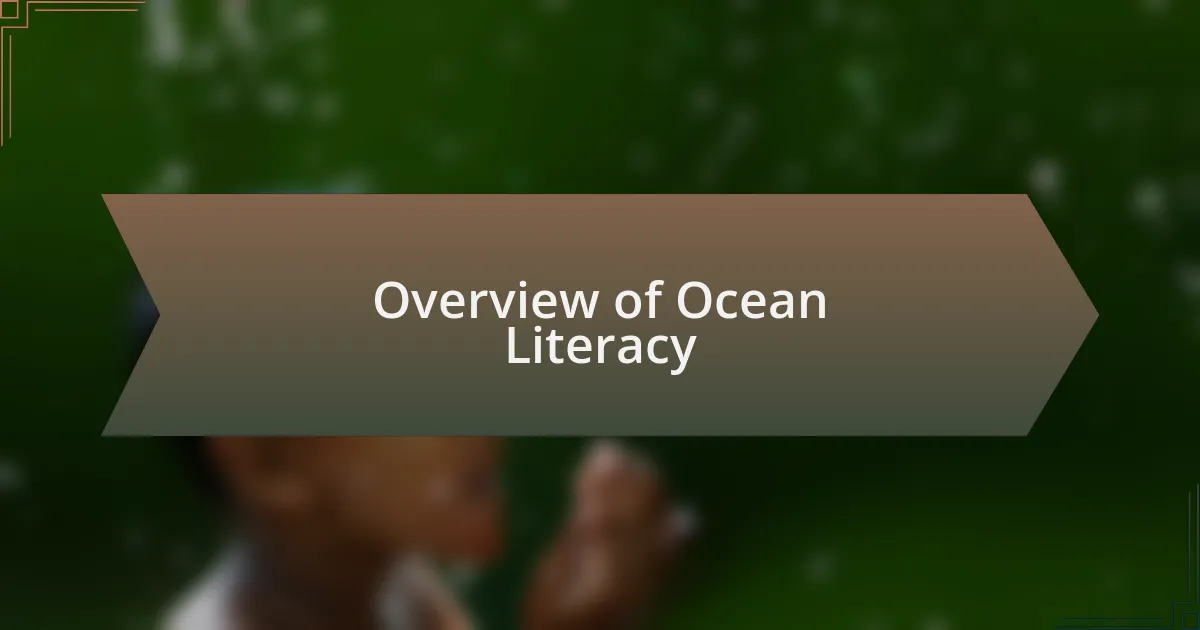
Overview of Ocean Literacy
Ocean literacy is fundamentally about understanding the ocean’s influence on us—on our weather, climate, and food sources—as well as our impact on the ocean. For me, the moment I first explored a coral reef and marveled at the vibrant life beneath the waves, it became clear just how interconnected we are with these ecosystems. How often do we think about where our seafood comes from or the health of the waters that surround us?
As I delved deeper into ocean literacy, I realized it encompasses not just scientific knowledge but also emotional connections to our oceans. I recall volunteering for a beach clean-up; seeing the sheer amount of plastic pollution stirred my passion for educating others. It’s striking to think how a simple lesson about ocean currents can empower children to become stewards of the environment. After all, if they understand the ocean, won’t they be more motivated to protect it?
Ocean literacy extends beyond classrooms and into communities. Engaging local families in discussions about marine conservation can foster a sense of responsibility and respect towards our oceans. I often ask myself, what lasting legacy do we want to leave for future generations? By promoting ocean literacy, we can inspire a newfound reverence for the seas that support life on Earth, encouraging both learning and action.
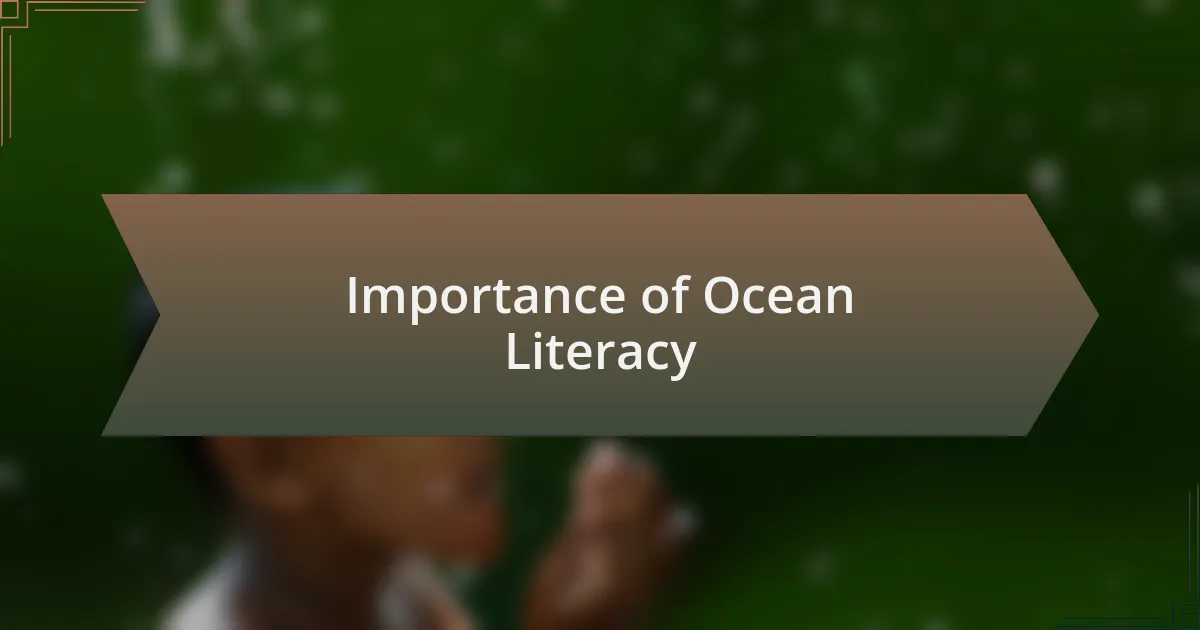
Importance of Ocean Literacy
Understanding ocean literacy is vital because it shapes our awareness of the ocean’s role in our lives and helps us recognize our responsibilities towards it. I remember the first time I saw a tide pool thriving with life; it sparked a curiosity within me to learn more about marine ecosystems. How can we expect children to care for something they don’t understand or appreciate?
When communities embrace ocean literacy, the ripple effect can be astonishing. I once witnessed a group of children educated about coral reefs organizing a fundraising event for reef restoration. Their level of engagement was inspiring; it showed me that when we equip young minds with knowledge, they become proactive, and this advocacy fosters lasting change. Isn’t it powerful to think that these kids could be the future voice of our oceans?
Additionally, promoting ocean literacy can bridge cultural gaps. In my experience, sharing stories about maritime traditions often brings disparate groups together, united by a shared appreciation for the ocean. This connection nurtures an emotional bond, encouraging collective stewardship. Don’t you think that when we understand our shared heritage with oceans, we become more inclined to protect them for the future?
Role of Children’s Discovery Centers
Children’s Discovery Centers play a crucial role in fostering ocean literacy among young minds. I vividly recall a day spent at my local center, where lessons about the ocean were brought to life through interactive exhibits. Those hands-on experiences left a lasting impression on me; they truly turned abstract concepts into something real and relatable. Have you ever watched children’s eyes light up when they discover a hidden ocean creature in a touch pool?
These centers not only provide information but also create a nurturing space for exploration and curiosity. I often see children engaging in activities that connect them to the ocean, like creating art from marine debris. This kind of creative expression encourages them to think critically about ocean conservation. Isn’t it exciting to imagine how these experiences can shape their values and future actions?
The impact of Children’s Discovery Centers extends beyond the individual child. When kids participate in group activities focused on marine life, they learn the power of teamwork and collective responsibility. I remember participating in a cleanup event organized by one such center, and seeing families bonding while doing their part for the ocean was truly heartwarming. Could it be that such shared experiences might inspire a new generation committed to ocean stewardship?
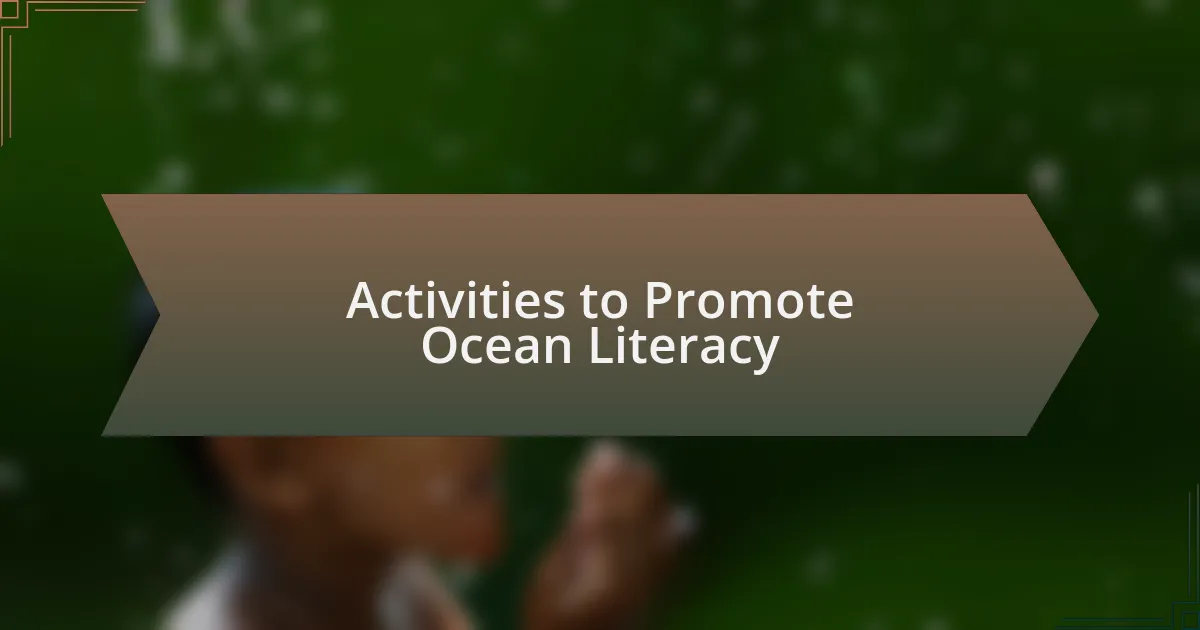
Activities to Promote Ocean Literacy
One effective activity to promote ocean literacy is to organize marine-themed scavenger hunts. I recall a time when my friends and I ventured through an aquarium, armed with a list of ocean facts and hidden treasures to find. It was thrilling to race against the clock, spotting sea turtles or identifying various fish species. How cool is it to combine fun with learning? This adventure not only heightened our knowledge but also deepened our appreciation for the underwater world.
Another engaging method I’ve witnessed is storytelling sessions that revolve around ocean adventures. I’ll never forget the captivating tales told at a children’s center, where a storyteller transformed into a pirate, taking us on a voyage across the seas. The excitement in the room was palpable as children learned about marine creatures and their habitats through imaginative narratives. Doesn’t it evoke a sense of wonder and curiosity to see ocean life come alive in our minds?
Hands-on experiments, such as creating mini-ecosystems, serve as a powerful tool for understanding ocean ecosystems. I remember the awe I felt watching our tiny aquarium thrive with life after weeks of nurturing. It was an enlightening experience, showing us not just the beauty but also the fragility of these environments. Isn’t it fascinating how hands-on activities can foster a profound sense of responsibility for our oceans?
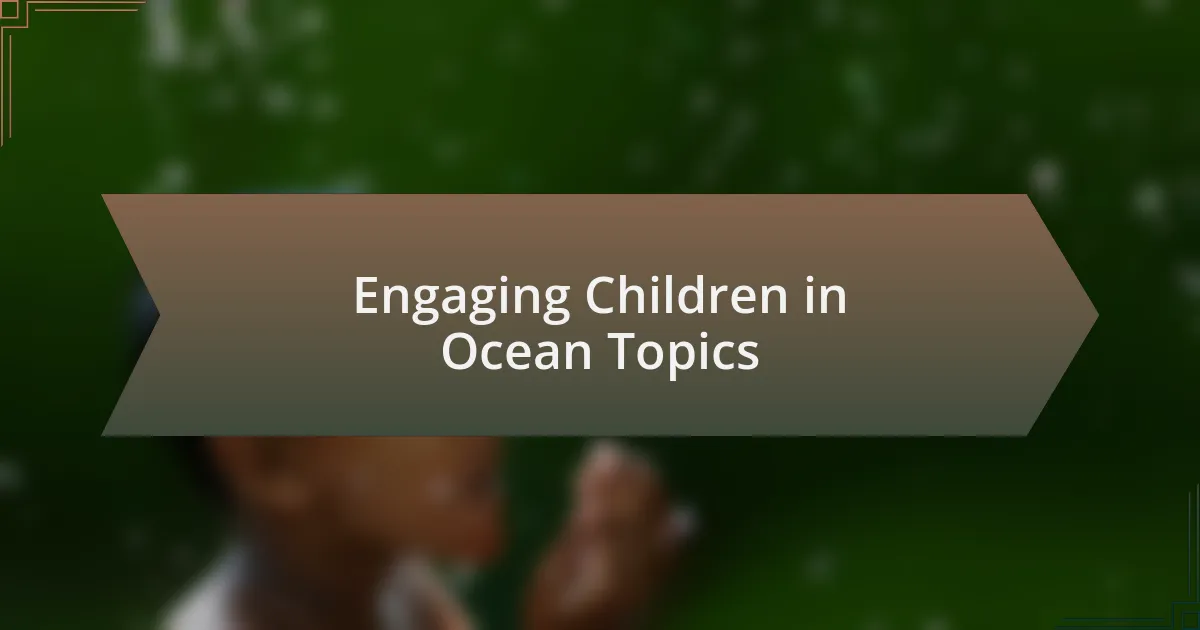
Engaging Children in Ocean Topics
One of the most delightful ways I’ve engaged children with ocean topics is through art projects that focus on marine life. I remember a vivid session where each child created their favorite sea creature using recycled materials. Watching their faces light up as they transformed trash into treasures was a reminder of how creativity can spark an interest in conservation. Have you ever seen a child proudly display their creation and excitedly share facts about that creature? It’s that connection to art and science that can truly ignite passion.
Incorporating interactive demonstrations, such as simple water filtration experiments, also captivates young minds. I recall conducting an activity where children experimented with different materials to filter water, simulating ocean health. The moment they saw clear water emerge from muddy mixtures was pure magic! It raised questions about real-world applications, prompting curious minds to ponder: How do we keep our oceans clean and vibrant? Engaging them in these thought-provoking discussions not only teaches them about ocean ecosystems but also encourages lifelong stewardship.
Moreover, organizing beach clean-up events can be a game-changer in fostering a strong connection with the ocean. I once participated in a clean-up with a group of kids who were initially hesitant but soon became enthusiastic as they discovered treasures washed ashore. Their curiosity grew as they learned about the environmental impact of marine debris on wildlife. This firsthand experience empowered them, igniting a sense of responsibility that I believe will stay with them for years to come. Isn’t it inspiring to see young individuals take action for something they now understand and care about?
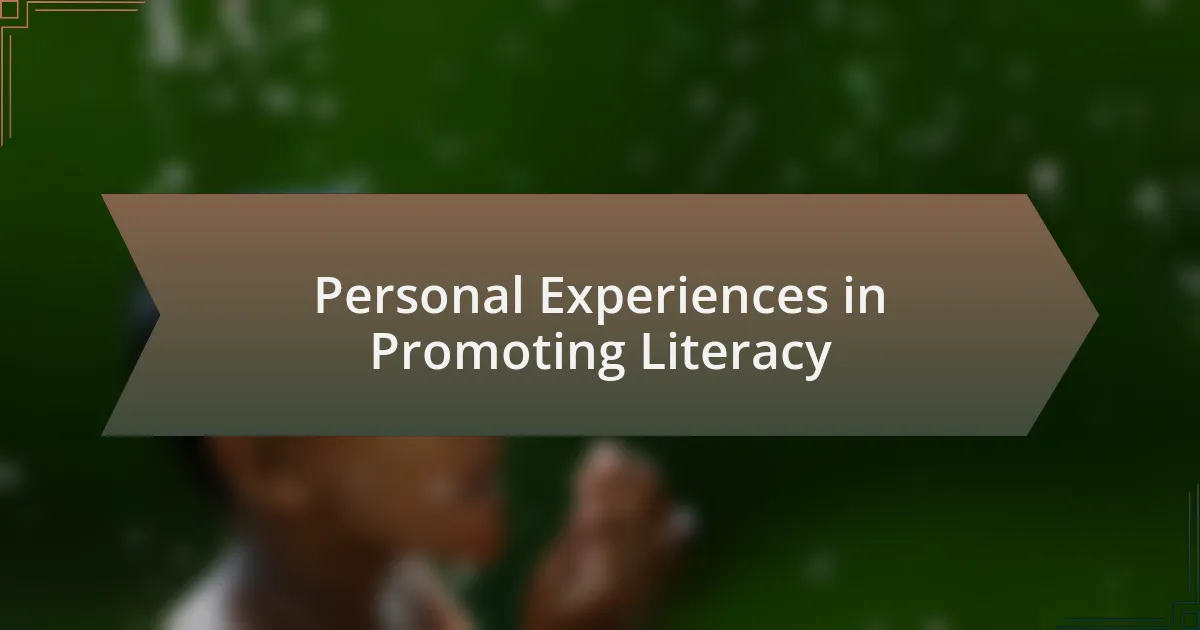
Personal Experiences in Promoting Literacy
When I think about my efforts in promoting literacy, one memorable moment stands out: organizing storytelling sessions focused on ocean adventures. I vividly remember reading a captivating tale about a young dolphin that dreams of exploring the world’s oceans. The children’s eyes sparkled with excitement as they followed the dolphin on its journey, which opened up a floodgate of questions about marine animals and their habitats. Isn’t it amazing how a simple story can lead to such profound curiosity and learning?
In another instance, I created a mini-library of books about the ocean, complete with interactive elements like flaps and textures. I was surprised to see how some of the more reserved children would blossom as they explored these tactile stories. Their faces lit up when they discovered the different textures of coral and felt the smoothness of a fish’s scales. Have you ever noticed how a hands-on approach can transform learning from a passive experience into an exhilarating adventure?
I also recall a time when I collaborated with local authors to host readings and discussions about marine themes. One particular session left a lasting impression on me. A shy child, who typically blended into the background, bravely raised her hand to share her thoughts on ocean conservation. Witnessing her transformation from a quiet observer to an engaged participant was incredibly rewarding. It reminded me that fostering an environment where literacy intersects with personal expression can empower even the most reserved voices.
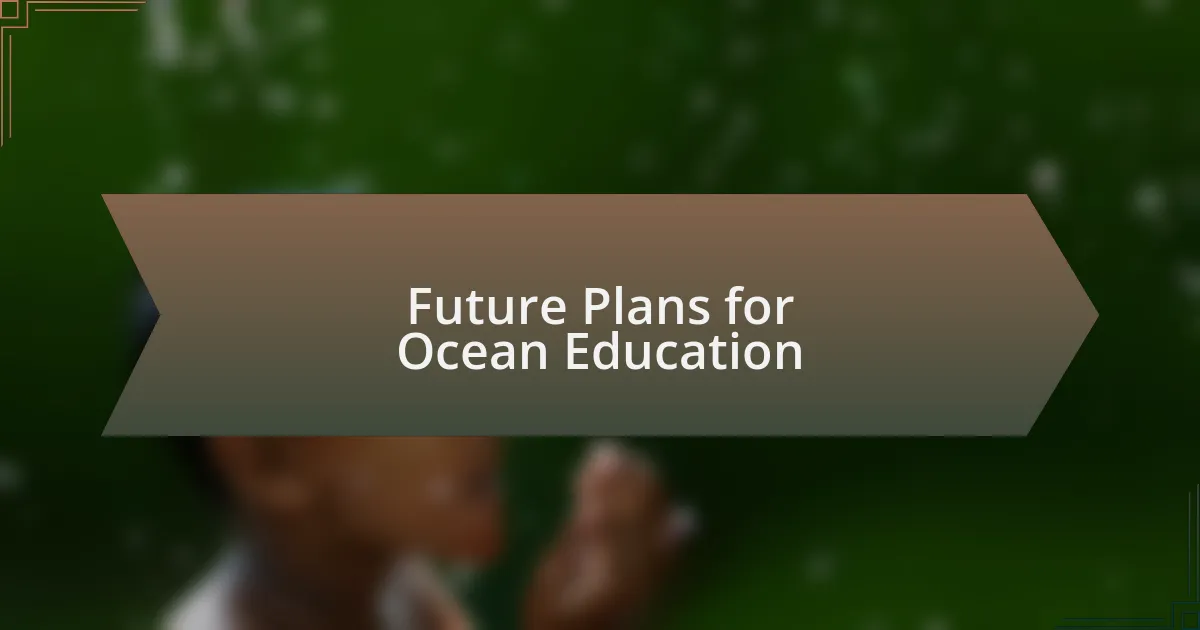
Future Plans for Ocean Education
As I look ahead, I envision creating a series of engaging workshops that delve deeper into ocean ecosystems. Imagine children discovering the intricate connections between marine life through hands-on experiments, such as creating their own mini-aquariums. I believe that witnessing the growth of living organisms firsthand can ignite a passion for ocean conservation that textbooks alone cannot inspire.
In addition, I’m excited about the possibility of collaborating with environmental organizations to facilitate beach clean-up events for families. These experiences not only teach children about the impact of pollution but also empower them with the knowledge that their actions can make a real difference. I often ask, how can we expect future generations to care for the oceans if they don’t feel a personal connection to them?
Lastly, I plan to incorporate digital platforms, like interactive storytelling apps that focus on ocean literacy, into our programs. Children can experience ocean adventures through virtual reality that feels remarkably tangible. This blend of technology and education provides an innovative way to captivate young minds and reinforces the idea that ocean health is an ongoing journey, one that they can actively participate in.